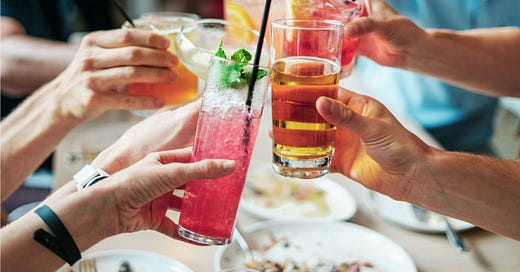Daily, we are confronted with headlines about the overwhelming harms of meth, fentanyl, cocaine, as well as newer, scary drugs such as xylocaine (“Tranq Dope”), tianeptine (“gas station heroin’’), and even deadlier synthetic opioids (e.g., nitazines). These drugs are, in fact, quite destructive, their use is often fatal, and they are worthy of deep concern. Yet, by many measures, the most dangerous drug of all is legal, sold in ubiquitous corner stores to anyone over twenty-one, and is, in many ways, celebrated by our society.
At social gatherings, the first question one often confronts is, “what will you have to drink?” If you ask for something non-alcoholic, people often ask you, “why don’t you drink?” as if this is something shameful or abnormal. It’s really none of their business, and all of us are allowed to choose whether or not we like alcohol.
With legalization, there has been some movement toward substitution of cannabis for alcohol. Cannabis has its own set of potential harms – see my blog “Using Cannabis Safely”. Yet, cannabis is almost always safer than alcohol, and the substitution effect of legalization represents harm reduction at its finest. Nonetheless, problems from alcohol use continue to rise.
Binge drinking on college campuses remains prevalent. Binge drinking is defined as consuming 5 or more drinks during a single occasion for men and 4 for women (men and women metabolize alcohol differently). A 2022 study demonstrated that, among full-time college students ages 18-22, 49% drank alcohol and 28.9% engaged in binge drinking within the last month. Among Americans aged 35-50, binge drinking is rising. Even among seniors, this is a surprisingly common problem. Ten percent of Americans over 65 report binge drinking within the last month. Overall, 61 million, or 21.7% of people in the United States ages 12 and older, reported last month binge drinking.
Binge drinking is associated with acute harms such as blackouts, overdoses, and alcohol poisonings. It increases the likelihood of unsafe sexual behavior, which people tend to greatly regret. There are also increases in all kinds of deadly accidents such as falls, drownings, burns, and car crashes. People can get into fights. One can even develop acute pancreatitis from binge drinking - an ugly and painful condition, which I have helped treat, during my medical residency.
Keep reading with a 7-day free trial
Subscribe to Grinspoon on Drugs to keep reading this post and get 7 days of free access to the full post archives.





